community
EEA-ESEM '09 brings new understanding of the crisis and introduces BSE internationally

The 2009 EEA-ESEM Congress, the first major international academic event of its kind hosted by BSE, came to an end last Thursday, 27 August.
The meeting brought together 1,800 economists from academic and financial institutions around the world (up from 1,600 participants at last year’s EEA-ESEM, held at Universita' Bocconi in Milan).
The sheer amount and variety of economic research presented at the meeting meant attendees could fill each day with sessions most relevant to their specific areas. The 1,443 papers presented during the week covered topics across the spectrum of economic research interests and included 48 invited sessions, six plenary conferences and an institutional session headed up by European Commission President José Manuel Barroso and Catalan Minister of Economy and Finance Antoni Castells.
Prof. Albert Carreras (UPF-BSE) chaired the Local Arrangements Committee for the Congress. He reflected on the many successes of the week, both for BSE and for the field of economics.
“The annual EEA-ESEM Congress is the most important economic research gathering in Europe,” Prof. Carreras said. “The confidence that these two large economic associations have demonstrated in the BSE is the first success of this year's Congress. The BSE has introduced itself as an institution to the entire economics profession, and has also presented its two campuses at Bellaterra and Ciutadella, one a traditional university campus and the other a radically urban campus.
“Finally - and most important - this year's Congress has been intellectually vibrant, with all of the research directly or indirectly oriented toward investigating the foundations of the current economic crisis. The research presented this week has contributed intensely to our understanding of the crisis,” Prof. Carreras said.
The intense week of economic research presentations ended with a celebration at the Casa Llotja, historic center of commercial activities in Barcelona since the middle ages and for many years one of the top powerhouses of economic and commercial activity in the Mediterranean.
BSE Preparation and Participation
Hosting an event of these proportions involved months of planning directed by BSE affiliated professors, including Prof. Antonio Ciccone (ICREA-UPF and BSE) who presided over the EEA Program Committee, as well as the GSE team that comprised the Local Arrangements Committee:
• Prof. Albert Carreras (Chair), Universitat Pompeu Fabra and BSE
• Prof. Carmen Beviá, Universitat Autònoma de Barcelona and BSE
• Prof. Jordi Brandts, Universitat Autònoma de Barcelona, Institute for Economic Analysis (CSIC) and BSE
• Dr. Eduard Vallory (Secretary), BSE Director-General
In addition to the role BSE professors played in organizing the Congress, more than 20 affiliated professors presented papers throughout the week. Their research included work in areas such as labor markets and gender, education policy, wealth distribution and inequality, bounded rationality, and nonparametrics. Academics from all four of the GSE’s founding academic bodies presented papers at the Congress.
Prof. Ghazala Azmat (UPF-BSE) was among the BSE affiliated professors in attendance at this year’s EEA-ESEM, and she noted that the sheer size and scope of the Congress was impressive. “If you have broad research interests it is sometimes difficult to choose from such a wide range of parallel sessions.”
BSE professors took advantage of having the Congress on their home turf to reconnect with colleagues from other countries. "It is always good to interact face-to-face with friends and colleagues. Having the opportunity to have it in our campus was a great experience,” Prof. Azmat said.
Keynote Speakers
Another advantage of hosting the Congress was the opportunity to welcome some of the most renowned economic scholars in the world to the BSE campus. What follows is a brief summary of each keynote speaker’s presentation (in chronological order):
 | Prof. Faruk Gul (Princeton University) Presentation Slides [pdf] Prof. Gul spoke about the econometric concepts of ambiguity and uncertain expected utility and their implementation in the market. He explained how individuals typically prefer to avoid known risks and situations about which there is little information. However, different sources of uncertainty may have different degrees of uncertainty. Professor Gul developed a framework based on modeling different sources of uncertainty in order to study how individuals perceive uncertainty and how averse they are to it. These are key considerations for economic decisions and hence are important for business and policy. |
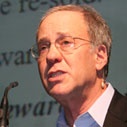 | Prof. Roger Myerson (University of Chicago), Nobel Prize 2007 Presentation Slides [pdf]
|
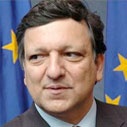 | Mr. José Manuel Barroso, President of the European Commission; and Prof. Antoni Castells, Minister of Economy and Finance of the Government of Catalonia
|
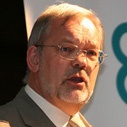 | Prof. Charles Bean, Deputy Governor of the Bank of England Presentation Slides [ppt]
|
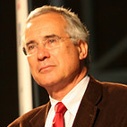 | Prof. Nicholas Stern (London School of Economics) Prof. Stern discussed the mistakes and achievements in economics since the end of World War II. He argued that economists have not played a sufficient role in challenging the economic policies for the last 50 years while noting that new developments in economic theory have given us a better understanding of the roots of human action. Prof. Stern explained the necessary steps that must be taken to avoid climate change and stressed the importance of changing human patterns of behaviour. |
 | Prof. Guido Imbens (Harvard University) Presentation Slides [pdf] Prof. Imbens evaluated the impact on academic results when changes in the allocation by gender in schooling occurred. Prof. Imbens’ simulations aimed at improving the measurement of effects of public policies of segregation or inclusion in different circumstances. His concern was to detect and measure properly the results obtained by an individual depending on the changes occurring in his social spillover. |
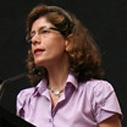 | Prof. Pinelopi Goldberg (Princeton University) Presentation Slides [ppt]
|
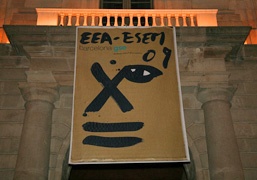
To commemorate EEA-ESEM 2009, the BSE commissioned a print by the Catalan artist Agustí Puig, who inspired the artwork in the film "Vicky Cristina Barcelona."
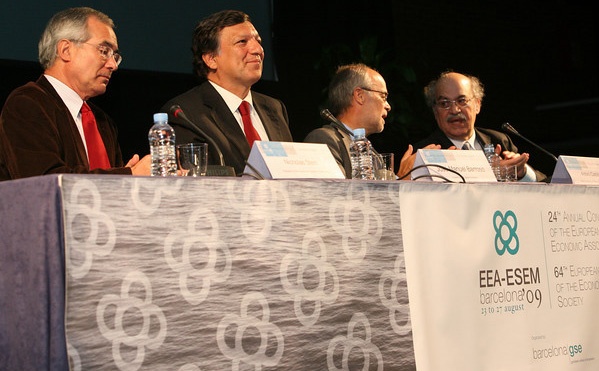
Prof. Lord Nicholas Stern (LSE), President Barroso, Prof. Antoni Castells, Catalan Minister of Economy and Finance, and Prof. Andreu Mas-Colell, Chairman of the BSE.
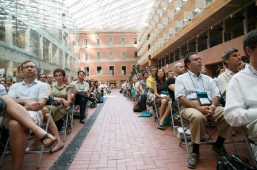
In all, 1800 attendees filled the BSE campus during the course of the week. Here, an audience listens to a presentation at the UPF campus.

The intense week ended with a celebration at the Casa Llotja, historic center of commercial activities in Barcelona since the middle ages and for many years one of the top powerhouses of economic and commercial activity in the Mediterranean.
